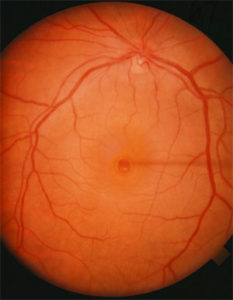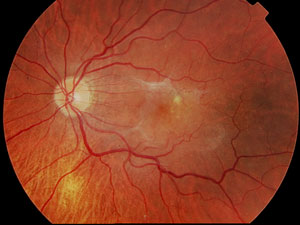Macular Hole & Macular Pucker Treatment
Macular Hole
 A macular hole is a small break in the macula. It can cause blurred and distorted central vision. In severe cases, a macular hole can lead to a detached retina, which is considered an ocular emergency and immediate treatment is needed.
A macular hole is a small break in the macula. It can cause blurred and distorted central vision. In severe cases, a macular hole can lead to a detached retina, which is considered an ocular emergency and immediate treatment is needed.
Causes
Macular holes are related to aging and usually occur in people over age 60. As we age, the vitreous, the jelly-like substance that fills the eye, slowly shrinks and pulls away from the surface of the retina. When the tension is too tight, the retina can tear and cause a hole. Macular holes can also occur from eye disorders, such as high myopia (nearsightedness), macular pucker, and retinal detachment; eye disease, such diabetic retinopathy and Best’s disease; and injury to the eye.
Symptoms
Vision loss due to a macular pucker varies. Patients can experience blurred and mildly distorted vision. Straight lines can appear wavy. Patients may have difficulty in seeing fine detail and reading small print. There may be a gray area in the center of your vision, or perhaps even a blind spot. They may have difficulty in seeing fine detail and reading small print. There may be a gray area in the center of your vision, or perhaps even a blind spot.
Treatment
Although some macular holes can seal themselves and require no treatment, surgery is necessary in many cases to help improve vision. The surgical procedure, called vitrectomy, is needed to remove the vitreous gel that is pulling on the retina. The gel is replaced with a bubble containing a mixture of air and gas. The bubble acts as an internal, temporary bandage that holds the edge of the macular hole in place as it heals.
Macular Pucker
 Macular pucker, also known as Epiretinal Membrane, is scar tissue that develops on the macula and can cause blurred and distorted central vision. A macula pucker appears when the vitreous, the jelly-like substance that fills the eye, shrinks and pulls away from the retina. This process is called vitreous detachment and is normal due to the aging process. However, when the vitreous pulls away, the retina begins to heal and scar tissue appears. When the scar tissue contracts, it causes the retina to wrinkle or pucker. If the scar forms over the macula, central vision is affected.
Macular pucker, also known as Epiretinal Membrane, is scar tissue that develops on the macula and can cause blurred and distorted central vision. A macula pucker appears when the vitreous, the jelly-like substance that fills the eye, shrinks and pulls away from the retina. This process is called vitreous detachment and is normal due to the aging process. However, when the vitreous pulls away, the retina begins to heal and scar tissue appears. When the scar tissue contracts, it causes the retina to wrinkle or pucker. If the scar forms over the macula, central vision is affected.
Symptoms
Vision loss due to a macular pucker varies. Patients can experience blurred and mildly distorted vision. Straight lines can appear wavy. Patients may have difficulty in seeing fine detail and reading small print. There may be a gray area in the center of your vision, or perhaps even a blind spot. They may have difficulty in seeing fine detail and reading small print. There may be a gray area in the center of your vision, or perhaps even a blind spot.
Treatment
When vision deteriorates to the point where it affects daily routine activities, surgery, called vitrectomy, is necessary. A vitrectomy, done during a 40-minute out-patient procedure, removes the scar tissue and the vitreous gel from inside the eye to prevent it from pulling on the retina. The gel is replaced with a saline solution.
